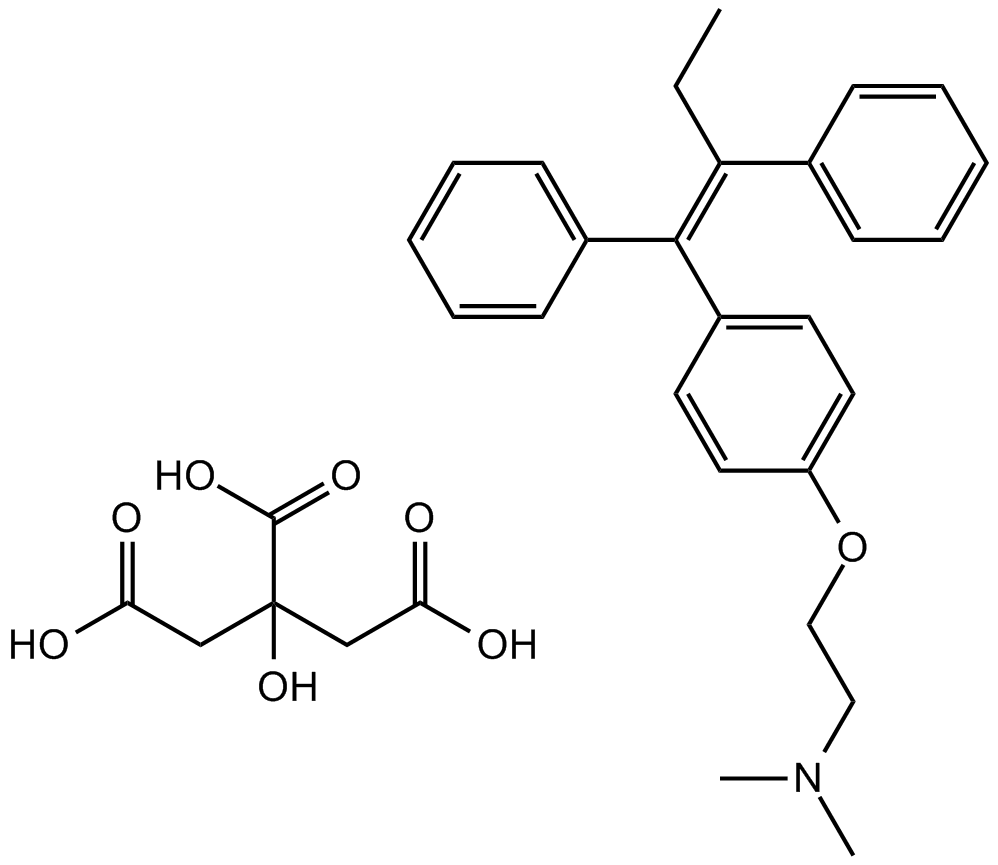Tamoxifen Citrate (Synonyms: ICI 46474, Istubal, Kessar, Noltam, Nolvadex, TMX, Valodex, Zemide) |
| Catalog No.GC11669 |
El citrato de tamoxifeno (ICI 46474) es un modulador selectivo del receptor de estrÓgeno (SERM) activo por vÍa oral que bloquea la acciÓn del estrÓgeno en las células mamarias y puede activar la actividad del estrÓgeno en otras células, como las células Óseas, hepÁticas y uterinas. El citrato de tamoxifeno es un potente Hsp90 activador y mejora la actividad ATPasa de la chaperona molecular Hsp90. El citrato de tamoxifeno también inhibe potentemente el EBOV infeccioso Zaire y Marburg (MARV) con IC50 de 0,1 μM y 1,8 μM, respectivamente. El citrato de tamoxifeno activa la autofagia e induce la apoptosis.
Products are for research use only. Not for human use. We do not sell to patients.

Cas No.: 54965-24-1
Sample solution is provided at 25 µL, 10mM.
Tamoxifen Citrate (ICI 46474) is a selective estrogen receptor modulator (SERM) which blocks estrogen action in breast cells and can activate estrogen activity in other cells, such as bone, liver, and uterine cells[1][2][3].Tamoxifen Citrate is a potent Hsp90 activator and enhances the Hsp90 molecular chaperone ATPase activity[4].
Tamoxifen Citrate (ICI 46474) shows strong inhibition of MCF-7 cells (EC50=1.41 μM) and to a lesser extent the T47D cells (EC50=2.5 μM) but does not affect the MDA-MB-231 cells[2].
The Tamoxifen Citrate-inducible gene knockout strategy has clear advantages in that expression of a gene can be ablated in adult mice at will in a tissue specific manner. To study the role of Med1 in adult heart, 7-week old TmcsMed1-/- mice are given a daily Iintraperitoneal injection of Tamoxifen Citrate at a dose of 65 mg/kg for 5 days and killed at selected intervals thereafter. qPCR analysis of RNA shows that the Med1 expression begin to decrease after 3 days of Tamoxifen Citrate injection (about 70% decrease), and by 5 days of injection, Med1 expression is almost non-detectable in the heart. Tamoxifen Citrate-inducible cardiac-specific disruption of Med1 (TmcsMed1-/-) in adult mice causes dilated cardiomyopathy[3].
References:
[1]. Osborne CK. Tamoxifen in the treatment of breast cancer. N Engl J Med. 1998 Nov 26;339(22):1609-18.
[2]. Hawariah A, et al. In vitro response of human breast cancer cell lines to the growth-inhibitory effects of styrylpyrone derivative (SPD) and assessment of its antiestrogenicity. Anticancer Res. 1998 Nov-Dec;18(6A):4383-6.
[3]. Jia Y, et al. Cardiomyocyte-Specific Ablation of Med1 Subunit of the Mediator Complex Causes Lethal DilatedCardiomyopathy in Mice. PLoS One. 2016 Aug 22;11(8):e0160755.
[4]. Zhao R, et al. Tamoxifen enhances the Hsp90 molecular chaperone ATPase activity. PLoS One. 2010 Apr 1;5(4):e9934.
Average Rating: 5 (Based on Reviews and 2 reference(s) in Google Scholar.)
GLPBIO products are for RESEARCH USE ONLY. Please make sure your review or question is research based.
Required fields are marked with *




















